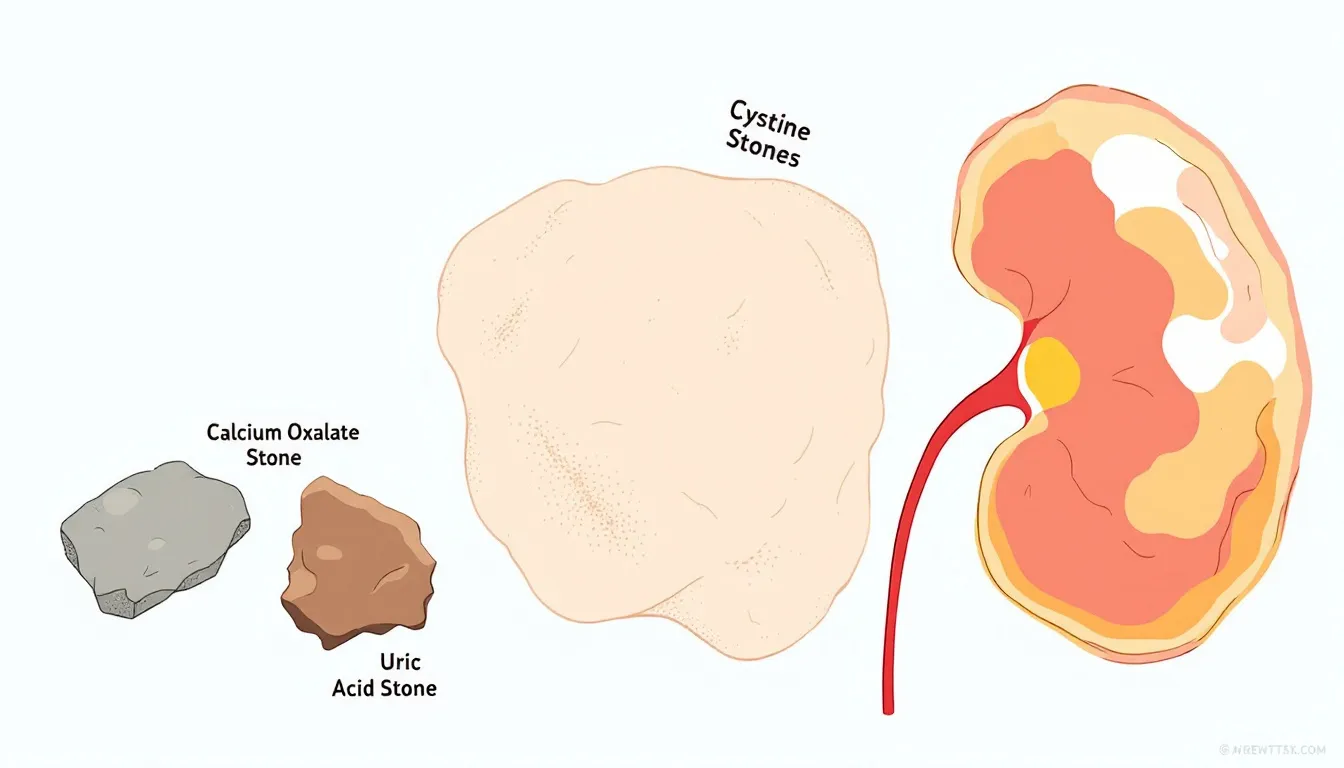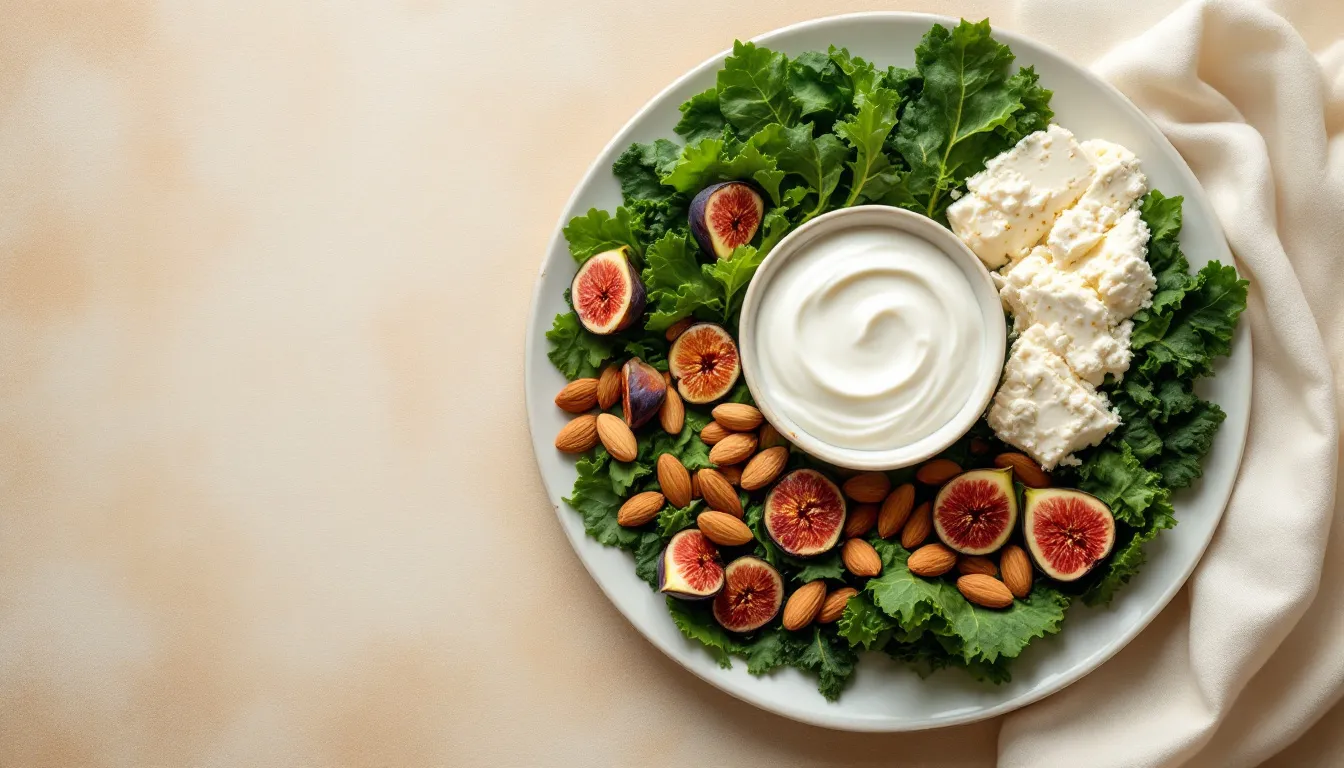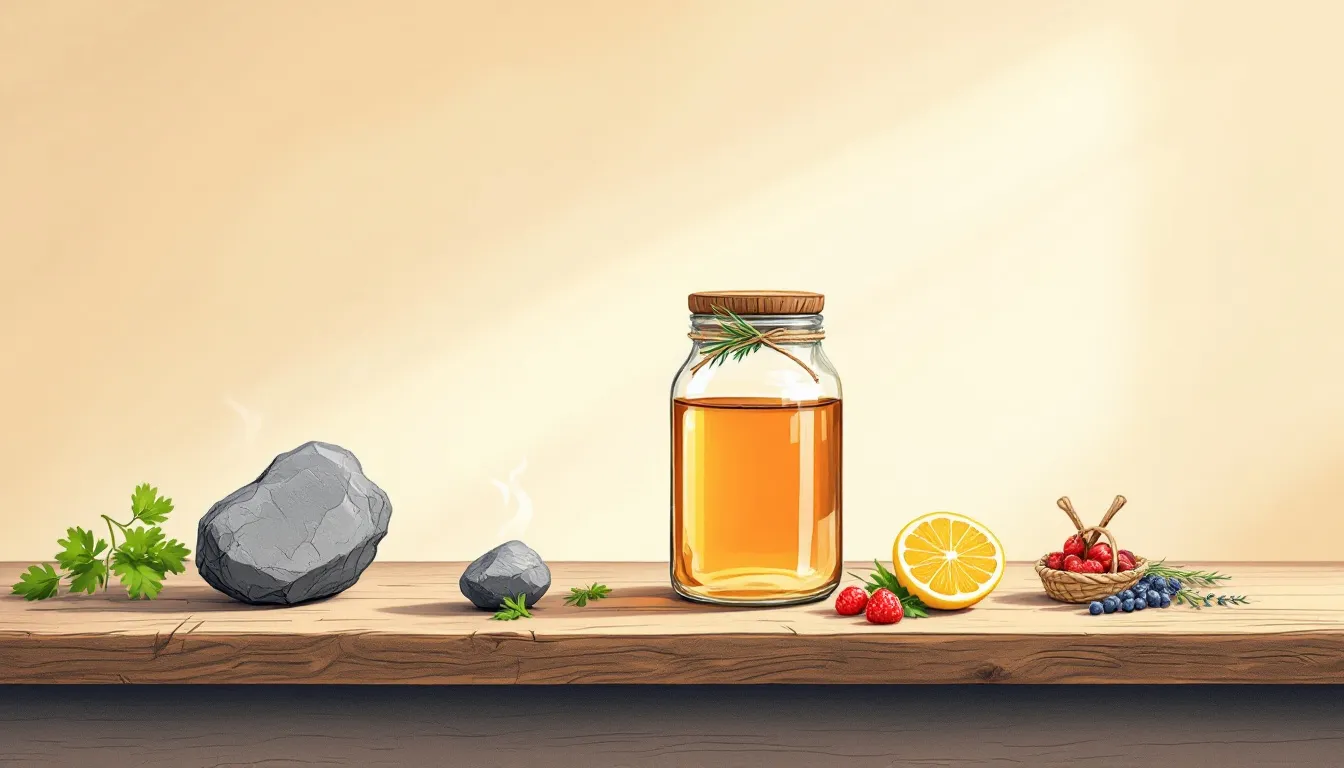Kidney stones are painful. Fortunately, you can manage them at home. This article explores the top 7 home remedies for kidney stones, including hydration, diet changes, and herbal treatments. Learn how to ease your pain and prevent future stones naturally.
Key Takeaways
- Kidney stones are solid deposits formed from mineral and salt imbalances in urine, with calcium oxalate stones being the most common type.
- Staying hydrated and making dietary changes, such as reducing sodium and oxalate-rich foods, are key strategies for preventing kidney stones.
- Natural remedies like lemon juice, apple cider vinegar, and herbal extracts can aid in managing kidney stones, but medical intervention is necessary for severe cases.
What Are Kidney Stones
Kidney stones, also known as renal calculi, are solid deposits that form from minerals and salts inside the kidneys. They can vary in size, from small kidney stones to large stones that can cause significant pain and discomfort. The formation of kidney stones occurs when there is an imbalance in the substances that make up your urine, leading to the crystallization of minerals and salts.
Most kidney stones are composed of calcium oxalate, but there are different types, each with its own causes and risk factors. Understanding the types, causes, and symptoms of kidney stones is crucial for effective prevention and treatment.

Types of Kidney Stones
Kidney stones come in various types, each with unique characteristics and causes. Calcium stones are the most common type. They typically form as calcium oxalate. These are typically linked to high levels of calcium and oxalate in the urine.
Here’s a breakdown of the main types of kidney stones:
- Calcium Oxalate Stones: The most prevalent type, often associated with high oxalate foods like spinach and nuts.
- Uric Acid Stones: More common in men, these stones are linked to low hydration and high animal protein diets.
- Struvite Stones: Often result from urinary tract infections and can grow rapidly.
- Cystine Stones: Caused by a genetic disorder called cystinuria, leading to excess cystine in urine.
Understanding these types can help in choosing the right preventive measures and treatments.
Causes and Risk Factors
Kidney stones form when your urine contains high levels of crystal-forming substances like calcium, oxalate, and uric acid. Low fluid intake is a significant risk factor as it leads to concentrated urine, which promotes forming kidney stones, especially in hot climates.
Here are some key risk factors for developing kidney stones:
- Diet: High in sodium, sugar, and protein can increase the risk.
- Obesity: Linked to higher risks due to increased body mass index.
- Medical Conditions: Renal tubular acidosis and repeated urinary tract infections elevate the risk.
- Family History: A significant risk factor for developing kidney stones.
Understanding these causes and risk factors allows you to take proactive steps to reduce the likelihood of developing kidney stones.
Common Symptoms
The most common symptom of kidney stones is severe pain, which often begins when a stone moves into the ureters, causing significant discomfort. The pain is typically sharp or cramping and can radiate from the back and side to the lower abdomen and groin.
Other symptoms include:
- Nausea and Vomiting: Often accompany the pain.
- Blood in Urine: Can give the urine a pink, red, or brown tint.
- Frequent Urination: Or a persistent urge to urinate, often in small amounts.
Natural Fluids to Dissolve Kidney Stones
Natural fluids play a crucial role in both preventing and dissolving kidney stones. Adequate hydration helps ensure that urine remains diluted, reducing the risk of developing kidney stones by preventing crystal formation.
Let’s explore some of the most effective natural fluids that can aid in managing kidney stones.
Drinking Water
Water consumption is a simple and effective way to prevent kidney stones. Proper hydration increases urine output, which helps pass stones and prevents new formations. Aim to produce at least 2 to 2.5 liters of urine daily, and ensure your urine is a light pale yellow to indicate proper hydration.
Other beneficial drinks include wheatgrass juice, kidney bean broth, celery juice, and lemon juice.
Lemon Juice
Lemon juice is rich in citric acid, which helps inhibit the growth of crystals and stones. Daily intake of lemon juice can elevate urine citrate levels, preventing the formation of calcium-based stones and assisting in breaking down existing deposits.
Drinking a concentrated form of lemon juice diluted in water can enhance citrate levels in urine, aiding kidney stone prevention.
Pomegranate Juice
Pomegranate juice can help balance urinary pH levels, potentially reducing the likelihood of stone formation. It is associated with maintaining a healthy urinary pH, which may deter kidney stone development.
Regular consumption of pomegranate juice can contribute to overall kidney health and help in preventing kidney stones.
Dietary Changes to Prevent Kidney Stones

Making dietary changes is essential for preventing kidney stones. A diet high in fruits, vegetables, and whole grains while reducing sodium can effectively help in kidney stone prevention.
Let’s delve into specific dietary changes that can make a significant difference.
Reduce Sodium Intake
Limiting sodium intake is vital as high salt consumption can lead to increased calcium levels in urine, raising the risk of kidney stones. Excessive sodium consumption is linked to elevated calcium levels in urine, which can increase the risk of kidney stones.
Minimizing salt consumption can help prevent stones from forming.
Limit Oxalate-Rich Foods
Avoiding high-oxalate foods like spinach, beets, chocolate, and tea can reduce the risk of calcium oxalate kidney stones. Oxalates are compounds that can contribute to kidney stone formation, particularly calcium oxalate stones.
Limiting these foods is crucial for individuals at high risk of developing kidney stones.
Increase Dietary Calcium
Including calcium-rich foods in meals helps bind oxalates in the intestines, potentially lowering the risk of stone formation. Obtaining calcium from food rather than supplements is recommended to effectively reduce kidney stone risks.
Incorporating calcium-rich foods can help prevent calcium oxalate crystallization.
Apple Cider Vinegar for Kidney Stones

Apple cider vinegar is believed to help manage kidney stones by dissolving them and preventing their formation due to its acidic properties. The acetic acid in apple cider vinegar aids in breaking down kidney stones, making them smaller and easier to pass through the urinary tract.
Let’s explore how apple cider vinegar works and how to use it effectively.
How It Works
The acetic acid in apple cider vinegar helps dissolve kidney stones by breaking them down into smaller crystals. This process not only makes the stones smaller but also softens them, facilitating their passage through the urinary tract. Acetic acid may also dissolve calcium-based kidney stones, promoting their elimination from the body.
Usage Tips
To safely incorporate apple cider vinegar into your diet, dilute 1-2 tablespoons with water and drink before meals. This natural remedy can help manage kidney stones by breaking them down and preventing new stones from forming.
Always consult with a healthcare provider before starting any new treatment.
Herbal Remedies to Treat Kidney Stones
Certain herbal remedies have been studied for their potential benefits in managing kidney stones by promoting dissolution or passage of stones.
Let’s explore some effective herbal remedies for kidney stones that can aid in treating kidney stones.
Wheatgrass Juice
Wheatgrass juice is known for its ability to enhance urine flow, which can aid in the expulsion of kidney stones. Wheatgrass juice promotes increased urine output, assisting in the natural passage of stones through the urinary tract.
Incorporating it regularly can be beneficial.
Celery Seed Extract
Celery seed extract may help lower uric acid levels, which can be beneficial in preventing the formation of uric acid stones. This extract has shown to lower uric acid levels, potentially reducing the risk of forming uric acid kidney stones.
Including celery seed extract in your diet can aid in managing kidney stones.
Plant Extracts
Certain plant extracts like Phyllanthus niruri and Goldenrod have shown antispasmodic, antibacterial, and diuretic properties, which may help in managing kidney stones. These extracts can offer various therapeutic benefits to support kidney health and prevent stone recurrence.
Pain Management During Kidney Stone Passage
Managing pain during the passage of kidney stones is crucial, as the pain can be severe and debilitating. Effective pain relief methods include both medication and alternative methods.
Let’s explore some strategies for managing this pain.
Over-the-Counter Pain Relievers
Common over-the-counter options for kidney stone discomfort include nonsteroidal anti-inflammatory drugs (NSAIDs) like ibuprofen and naproxen, which can significantly reduce pain. These medications are often recommended for easing discomfort from kidney stones.
Tylenol and Advil can also be taken as needed.
Heat Therapy
Applying heat to the lower back or abdomen is an effective method to alleviate pain and reduce muscle tension associated with kidney stones. Using a heating pad or taking a hot bath can help relax the muscles and provide relief.
Heat therapy offers a natural approach to managing discomfort during kidney stone episodes.
When to Seek Medical Intervention
While home remedies can be effective, there are times when medical intervention is necessary. Professional medical intervention is crucial when dealing with kidney stones that cannot be managed at home.
Let’s discuss scenarios when you should seek medical help.
Large Kidney Stones
It is crucial to seek medical consultation if you suspect you have a large kidney stone, as they can cause severe pain and complications. Persistent pain may indicate the presence of a large kidney stone that could require medical intervention.
Consulting a doctor is essential to evaluate the need for further treatment.
Persistent Severe Pain
If home remedies fail to relieve severe pain associated with kidney stones, immediate medical evaluation is necessary. Pain that persists for more than a few hours, despite using pain relief methods, necessitates medical evaluation.
Surgical intervention may be required for stones larger than 5 millimeters that do not pass naturally.
Signs of Infection
Symptoms like fever and chills, when combined with kidney stone discomfort, may indicate an infection. A persistent fever or chills associated with kidney stone symptoms necessitates urgent medical care.
Recognizing signs of infection alongside kidney stone symptoms is crucial for timely treatment and avoiding further complications.
Lifestyle Changes to Prevent Kidney Stone Recurrence
Making long-term lifestyle changes is essential to prevent kidney stone recurrence. A healthy lifestyle, including dietary and hydration adjustments, can significantly lower the chances of developing kidney stones again.
Let’s explore some critical lifestyle changes that can help in preventing kidney stone recurrence.
Stay Hydrated
To effectively prevent kidney stones, it is recommended to consume at least 2 to 3 liters of water daily, particularly if living in hot climates or during strenuous activities. Consuming adequate fluids helps dilute substances in the urine that lead to stone formation.
Maintaining a steady urine flow by drinking plenty of fluids is crucial for preventing stone formation.
Balanced Diet
A diet rich in fruits and vegetables can enhance urinary citrate levels, helping to prevent calcium stone formation. A balanced diet that includes more fruits, vegetables, and whole grains can lower the risk of kidney stones as it helps maintain optimal urinary pH.
Maintaining a balanced diet is essential for overall kidney health.
Regular Check-Ups
Routine medical examinations are essential for monitoring kidney health and identifying early signs of potential stone development. Regular visits to a healthcare provider can aid in early detection of potential kidney stone issues, allowing for timely intervention.
Frequent health evaluations are crucial for preventing kidney stone recurrence.
Frequently Asked Questions
What are the main types of kidney stones?
The main types of kidney stones are calcium oxalate stones, uric acid stones, struvite stones, and cystine stones, each with unique causes and risk factors. It’s helpful to know these differences for prevention and treatment.
How can I prevent kidney stones naturally?
To prevent kidney stones naturally, focus on staying well-hydrated, cutting down on sodium and oxalate-rich foods, increasing your calcium intake, and adding natural juices like lemon or pomegranate to your diet. These simple changes can make a big difference!




